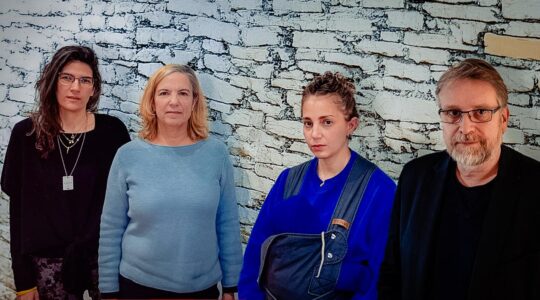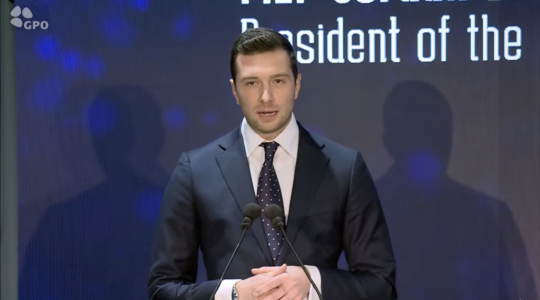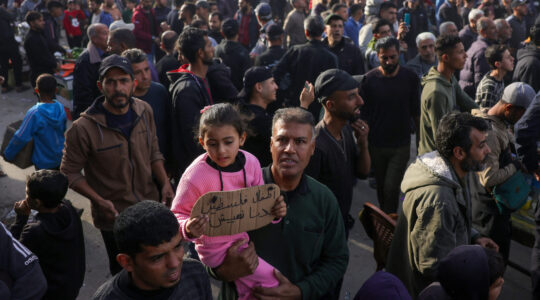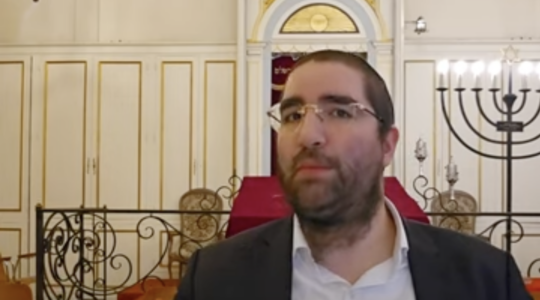
Kazakhstan’s new synagogue, Beit Rachel, was built in the heart of the sprawling new capital, Astana. (Michael J. Jordan)
ASTANA, Kazakhstan (JTA) — Seventy-five years ago, the once-nomadic Kazakhs endured a famine, purportedly orchestrated by Moscow, in which some 1 million people starved to death.
Not long after, Soviet dictator Joseph Stalin created a network of prison camps in Kazakhstan that in the late 1930s became the southern flank of his notorious Gulag, sucking in countless Kazakhs, Jews and myriad other ethnic groups.
Then, during the Holocaust, thousands of Jews from places such as Ukraine and Belarus were evacuated ahead of the onrushing Nazis eastward to the vast, sparsely populated steppes of Kazakhstan. The local Kazakhs mustered the hospitality to greet them with milk and bread.
“That which united our grandmothers and grandfathers makes us closer today,” says Jewish activist Valentina Kuznetsova, who lives in Karaganda, the country’s third-largest city.
Decades of Soviet repression and deprivation, followed by economic hardship today, have deepened the sense of shared destiny between Jews and Kazakhs.
“That’s why we’re happy even when our circumstances are difficult,” Kuznetsova says. “We know our grandparents suffered much more. We have no conflicts; everyone’s friendly and helps each other.”
Yet with independent Kazakhstan no longer dominated by Moscow, and local Kazakhs today flexing their muscles, the potential for tension certainly exists. The country of 15 million is almost evenly split between Kazakh Muslims and Russian Orthodox, with another 120-plus minority groups scattered about, including 15,000 to 20,000 Jews.
Meanwhile, in Kazakhstan’s south, police have arrested dozens of alleged members of the Hizb ut-Tahrir, a pan-Islamist group that advocates imposing Shari’ah, or Islamic law, over majority-Muslim states. While it professes nonviolence, Hizb also refers to suicide bombers as “martyrs,” calls for “dismantling the illegal entity” of Israel, and has been accused of inciting anti-Jewish and anti-Israel hatred.
However, the president of Kazakhstan, Nursultan Nazarbayev, has kept a lid on his country’s potentially combustible ethnic and religious mix. In fact, the iron-fisted ruler squelches all views and voices of dissent. Opposition politicians, human-rights activists and independent journalists land in jail, while the parliamentary Assembly of Nations rubber-stamps his every edict.
At the same time, non-traditional Western faiths such as Jehovah’s Witnesses, Baptists and Hara Krishna are often the target of raids, fines and bans, according to the Oslo-based watchdog Forum 18.
Yet these steps don’t garner much of a reaction from local Jewish leaders, who instead focus on the president’s encouragement of Jewish life. The non-reaction of the Chabad-dominated leadership is not surprising, given that Chabad rabbis focused on religious affairs across the former Soviet Union typically steer clear of criticizing government leaders.
In sprawling Astana, which Nazarbayev transformed overnight from a large village into the national capital a decade ago, Jews have a sparkling new house of worship, Beit Rachel, which opened four years ago.
Congregants say the synagogue’s central location and security-free perimeter, and the fact that its local benefactor, billionaire industrialist Alexander Mashkevich, has risen to become the country’s second-richest person, is all testament to traditional Kazakh tolerance.
“God gave this idea to Nazarbayev to not allow nationalism to grow but instead be tolerant among nations,” says the rabbi in Astana, the Chabad-Lubavitcher Yehuda Kubalkin. “So Kazakhstan has chosen another way. All people here live in peace and friendship.”
Kubalkin won’t find much disagreement across town, where a new state-controlled mosque complex also occupies prime real estate.
Even when asked about Israeli treatment of Palestinians, a young Koran teacher won’t bite.
While Israelis occupy Palestine, says Adilkhan Serikbay, 27, “it’s not a conflict between Jews and Muslims, a war between religions, but between Jews and Arabs, a war between nations.”
“Maybe some in Islam have an interest to make conflict between Muslims and Jews, but here it’s the opposite. From the president to the citizen, everyone wants peace, no one wants war,” he says, sitting cross-legged on the mosque’s enormous cherry-red carpet.
It’s a familiar story for Jews in many ex-Soviet republics, particularly in predominantly Muslim but authoritarian Central Asia: The community’s freedom to openly worship and celebrate traditions — virtually nonexistent during seven decades of Soviet repression — outweighs individual liberties such as freedom of speech.
Yet even beneath the president’s policies, the Jews of Kazakhstan — a disproportionate number of whom are elderly, as many of their children and grandchildren emigrated abroad — describe a Kazakh hospitality that has stretched back decades, even centuries to the reign of Ghenghis Khan.
While the Islamicization of nomadic Kazakhs first began with Arab conquest in the late seventh century, observers note a traditional moderation in their religiosity, with greater fealty to clan and tradition.
As for hospitality, says Israel’s ambassador to Kazakhstan, Ran Ichay, “There’s a Kazakh saying: ‘When a guest is in your yurt,’ ” — the felt-covered tent of nomadic Kazakhs — ” ‘it’s like God is in the yurt.’ ”
When Stalin deported Georgians, among dozens of other ethnic groups, to Kazakhstan in the late 1940s and early 1950s, Kazakhs displayed the same hospitality as during the Holocaust.
Aron Kozhiashvili, a Georgia-born Israeli recently visiting the synagogue in Almaty, Kazakhstan’s largest city, retold his story of flight as a child, breaking into tears over his bottle of vodka.
“Kazakhs are in my heart,” says Kozhiashvili, 62, an antiques dealer who shuttles between Israel, Kazakhstan and Georgia. “When our grandparents were deported here, they gave them food. They became our brothers, our sisters, even our father. No soul in the world is softer than the Kazakh soul.”
Recent tragedy presented Jewish officials a chance to repay their gratitude.
In 2006, some 120 Kazakh children in the southern region of Shymkent were found to have contracted HIV through contaminated blood transfused into their mothers during post-partum illnesses. At least nine children and one mother reportedly have died.
In response, the Jewish community created a special fund, Israel sent doctors and the American Jewish Joint Distribution Committee trained local Kazakhs to provide socio-psychological services to families.
When Jewish leaders traveled to the region to announce the support, the local mayor and other officials expressed their thanks, says Yeshaya Cohen, the chief rabbi of Kazakhstan.
“But I told them they didn’t need to,” he says. “It was our obligation. When we had a problem, you helped us survive.”
Asked for any hint of Kazakh anti-Semitism, Dina Itkina, 24, thinks hard. The only thing Itkina, a community activist from the northern city of Kokchetav, can produce is this: Kazakhs, like many across the region, hold stereotypes of Jews fueled by Soviet-era jokes about ethnic groups.
Itkina recalls being at university when she and classmates once bemoaned a cut in study stipends. After a quick calculation in her head, she remarked, “I’ll lose 36,000 tenge” — about $300.
Itkina recalls a classmate’s response: “You really are Jewish.”
She adds, “If someone is clever, or if someone is greedy, they say, ‘Oh, you’re Jewish.’ “
Occasional comments aside, that doesn’t mean all is carefree.
Reports of Hizb ut-Tahrir activities are monitored closely. One Jewish woman in cosmopolitan Almaty notes her unease at seeing more young Kazakh women donning the Islamic headscarf.
And unlike the large synagogue in Astana, 600 miles to the north, Cohen’s synagogue in Almaty is more guarded. He says a man from the government’s internal security visited two years ago and offered his cell phone number.
“The government is very, very afraid that people outside of Kazakhstan can negatively influence people within Kazakhstan,” the rabbi says. “He told me, ‘If you see or feel anything, let me know because we don’t want to wait until a spark becomes a fire.’ “
For Cohen, it suggests a more basic right than “democracy”: the right to live in peace and security.
“If you don’t check what everyone is doing, what harm they may be teaching, it’s no secret that some neighboring countries make propaganda in the name of religion,” he says. “Mr. Nazarbayev gives religion a chance, but only if done the right way.”
JTA has documented Jewish history in real-time for over a century. Keep our journalism strong by joining us in supporting independent, award-winning reporting.





